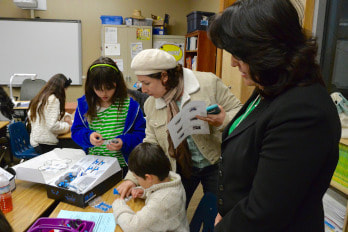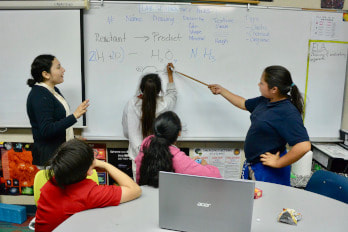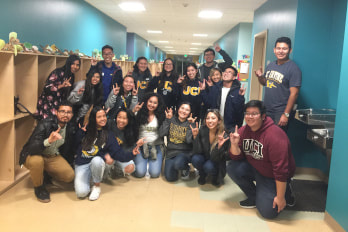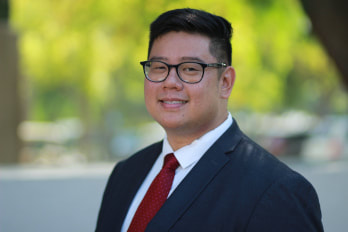|
David Liu's Super Science Squad project at El Sol Science and Arts Academy of Santa Ana has received a 2019 AERA SIG Civic Action and Social Engagement (CASE) Award. Background For the last three years, as part of his dissertation research and community engagement, PhD in Education student David Liu has been implementing an afterschool STEM program for 5th grade students at a local K-8 school, El Sol Science and Arts Academy in Santa Ana. El Sol educates a 900-student K-8 population described as 95% “Hispanic or Latino”, 73% “socioeconomically disadvantaged”, and 44.9% “English Learners.” David and his team (three faculty members and 19 undergraduate students at UC Irvine) have been collaborating with school personnel (four 5th grade teachers, the curriculum director, and the afterschool director) to implement weekly afterschool STEM programs and family engagement events. As a complement to the afterschool activities, David has hosted two Family Science Nights for the school with over 400 parents and K-8th grade students attending. During Family Science Night, families worked together to build, test, and improve model drones in a bilingual setting. The event provided opportunities for families to connect to college students, particularly bilingual and first-generation college students.
David’s research and afterschool program challenges deficit notions of communities of color, takes on an expansive view of culture, and focuses on transformative ways of STEM education teaching and learning. His research aims to challenge how the deficit model unfairly frames girls of color, their families, school, and communities as not having enough to support their STEM learning. David sees this framing as problematic as it judges and positions non-dominant communities and their girls of color as deficit without recognizing the assets that the girls bring. Instead, David unpacks how educators can open many opportunities and pathways to acknowledge the multiple experiences of girls of color by leveraging and recognizing cultural resources and practices of the students he works with. With an equity-related concern, David takes on an expansive view of culture, resources, and practices. The emancipatory goal of his research and community engagement is to shift how Latinas use education to empower themselves and their communities. As part of the afterschool program, each unit focuses on a community issue. Students not only consume but also produce scientific knowledges and practices in order to improve their community and engage in civic action. Example projects include students creating public service announcements of lack of access to food through an energy lens, producing video documentaries of community issues through an ecosystem lens, and creating inventions to solve community issues through an engineering design lens.
Guided by his educational research, David has designed the afterschool program so that students can leverage their cultural resources while doing science and also be recognized as community science experts. By doing so, his non-dominant students are able engage in various communities of practice across settings such as home practices and scientific practices. David’s work draws from critical ethnography and design-based research keeping in mind the transformative and social justice aims of his work. In doing so, he unpacks the multiple ways in which the phenomenon of Latinas’ STEM engagement is a representation of power relations and operates on who is recognized and who is afforded opportunities for STEM engagement. His research and community engagement challenge the normative discourses of who can do science across racial, gendered, ethnic, linguistic, and social economic diversity. Through his critical ethnography, his research does not merely describe “what is” STEM engagement of Latinas. Instead, his research offers theory, design, and practice of imagining “what could be” ways to support Latinas to engage in STEM, to transform systems of inequity, and to use STEM to improve the community. His work also engages with his students, their families, and their school community as design partners (those informing the approach to the design), learners (those providing feedback on their STEM experiences), and users of the afterschool STEM program and Family Science Night. Through this research and community engagement, David has offered other school districts, administrators, and afterschool educators his curriculum and expertise to design meaningful and equitable STEM learning opportunities
Comments are closed.
|
Resources for:
|
|







